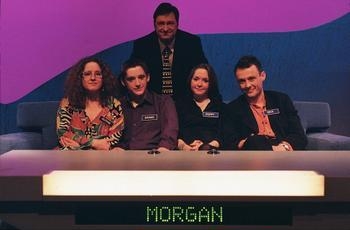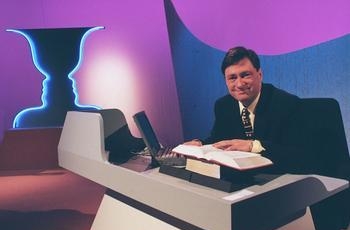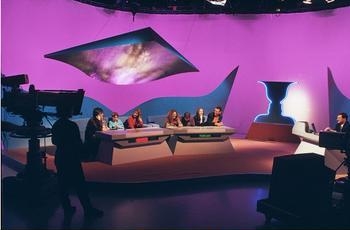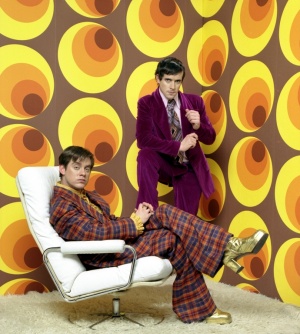Ask the Family
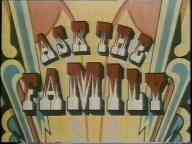
Contents |
Host
Robert Robinson (1967-84)
Alan Titchmarsh (1999)
Co-hosts
Dave Chapman (2005: as "Tiddler", and announcer "Mr Ha Ha Rubbish")
Broadcast
BBC1, 12 June 1967 to 22 October 1984 (221 episodes in 16 series)
BBC Birmingham for UK Gold and BBC Two, 6 June to 10 October 1999 (31 episodes in 1 series)
as Dick & Dom's Ask the Family BBC Two, 4 April to 6 May 2005 (23 episodes in 1 series)
Synopsis
In the beginning
Terribly middle-class quiz for families with serious-looking glasses and tight perms (and that was just the men).
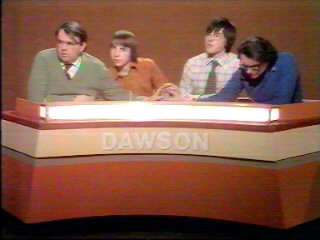 The teams were always made from four contestants.
The teams were always made from four contestants.That most BBC of contestant groupings, the species known as the "family of four", competed in a mixture of high-brow general knowledge and themed rounds.
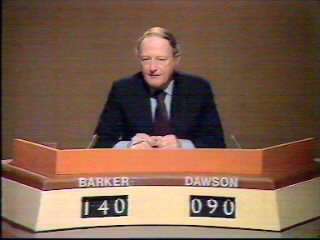 Original host, the late Robert Robinson.
Original host, the late Robert Robinson.Radio pundit and general intellectual bloke Robert Robinson fired the questions. Novelties included close-up photo questions, simple number and word games, and ultra lo-tech pieces of black and white cardboard that "animated" to reveal the answers for picture puzzles.
Not the BBC at its most dynamic, but it must have gone down well in Godalming and Cheadle.
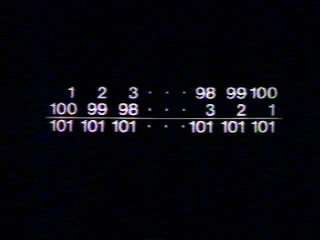 The idea of this puzzle was to realise that 1+2+3...+100 is the same as 50 pairs of 101, therefore the total is 5050.
The idea of this puzzle was to realise that 1+2+3...+100 is the same as 50 pairs of 101, therefore the total is 5050.We meet again
An unexpected remake was made in 1999, a co-production between UKTV and the BBC. The mix of questions was essentially the same hotch-potch of numbers, words, and whatever else came to hand. Naturally, the first person you'd think of to host a quiz is a gardener...?
But don't worry, for Alan Titchmarsh is an affable and witty enough host without crossing the line into Richard Whiteley "groandom".
The format was spruced up for the Nineties. First of all, a computer (what? technology?) had been introduced to help with the scoring and the puzzles. However, some things never change. The set was as compact as ever, and there was still no room (nor need, frankly) for a studio audience. The ultimate prize was a multimedia PC for the family. Runners-up got Ask The Family mugs each with their own names stamped on them.
Shows in this revival first went out on UK Gold during weekend teatimes. It was repeated on BBC2 during weekdays, with the final scheduled for 15 October. Over-running golf caused the final to be postponed, and it eventually went out four weeks later on 12 November.
Puzzles galore
The same varied mix of questions, written by Toby Freeman (a veteran question writer of many a quiz show, most notably the excellent Wipeout) was used in this 90s version. They ranged from straightforward general knowledge questions, to lateral thinking groaners, to dynamic picture-based puzzles.
One major change was that the questions are worth 20 points to begin with, but this was reduced the longer it takes for the teams to buzz in.
Here's a representative sample of the visual questions used:
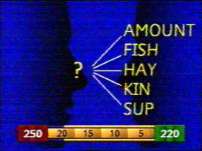
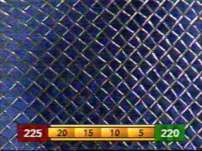
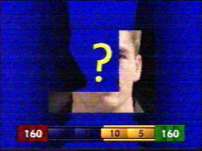
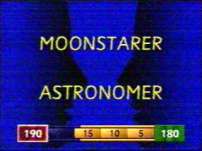
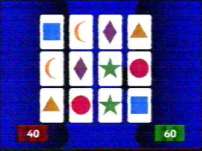
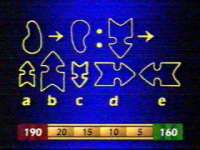
(top left) What word precedes all the other words?
(top right) What object is this?
(middle left) Who is this?
(middle right) An appropriate (or "cognate") anagram
(bottom left) A pelmanism "pick a pair" game in progress
(bottom right) A traditional IQ logic question
We meet again, again
The latest incarnation was broadcast on BBC2, and was widely hyped as the first primetime outing for Dick'n'Dom out of Da Bungalow. The BBC claimed it would appeal to everyone from kids to grannies. The truth is rather more frank than that - this is really a kids show at teatime, and as such its appeal is going to be very limited. This was certainly the case with the ratings, with 0.7m (4% share) as a typical showing against a more usual 2m for this slot. And as well as the viewers voting with their feet (or, rather, remote control buttons) it's received a critical mauling too.
So what's gone wrong? Mainly it falls between far too many stools that it only ends up appealing to 10-year-old fans of Dick and Dom who don't particularly like quiz shows. The questions lurch around from fairly entertaining to bog standard pub quiz. The comedy sketches are woefully unfunny (possibly even for D&D fans), in particular the comedy schtick of chasing the pretty hostesses which, as any comedy writer knows, never works as good as it looks on paper. Only the marvellous Dave Chapman comes out with any inspired laughs, particularly with his character of Tiddler, an expert who asks questions from the old Ask the Family.
To be fair, there are some good changes - there are some nice references back to the original series, there are far more questions aimed at the children (or "the little people" as they are referred to here), and there's no dull, minute-long clips of classical music.
About 10 shows into the series, a few sensible tweaks were put in (surnames on the desks, a proper scoreboard) which have certainly helped, although one of the things we liked about the new version - the brave crash start straight into Question One - was mysteriously dropped.
The final end game - Have Your Cake and Eat It - involves a chaotic cavalcade of cake scoffing after correct answers are given, with the family that are behind having one more slice of cake, thus making the size of the winning side's lead irrelevant. This too was later tweaked so that between one and five extra slices were added depending on the size of the points deficit. The whole thing is played purely for laughs with no sense of progress through the series.
In all, it's a bit of a culture shock and one wonders if this couldn't have been handled a bit better. Sure, things had to be updated but it looks like the balance between comedy and quiz has been misjudged. Shame.
Catchphrases
(Robert Robinson): "Ah, would that it were - would that it were!"
"...Now, this is a question for father and elder child only..." - or, "mother and younger child only", or whatever.
That's it! (the sign off during the Dick'n'Dom run, or aptly for the final episode - That is most definitely it!)
Inventor
Patricia Owtram, who was none too happy over the 2005 remake. In a letter to the Daily Telegraph she wrote:
"I was appalled that, in a programme in which small girls took part, there were so many jokes about willies and so much sexy cuddling between a presenter and an over-excited mother. I sound like a Grumpy Old Producer. I probably am. If the BBC was going to take someone's idea, make it over, use excerpts from it, repeat selected programmes, and devote airtime to knocking them down, it might have been a courtesy to tell the deviser that this was going to happen."
And there's more. In the same paper, Rosalind Gold (researcher/director/producer, 1968-1982) writes:
"Sir - I must concur with my colleague Patricia Owtram - watching Dick and Dom's Ask the Family is like witnessing your favourite aunt prostituting herself for a cheap thrill. Robert Robinson used to present the programme with wit, good humour and elegance: the families, selected for their intelligence and all-round ability, were allowed to shine.
"But the families in Dick and Dom's version serve only as stooges, willing props providing support for two capering dimwits who have nothing to offer but vulgarity. The whole farrago is an insult to the old programme, to the viewers and, if they could only realise it, to the families now unwisely taking part."
Theme music
The familiar twangy Indo-Greek music is "Acka Raga" by Joe Harriott and John Mayer. A remixed version is used for the 2005 show. The tune was also heavily sampled on Mint Royale's minor hit of a few years back, "From Rusholme With Love" (itself often used as background music on countless other TV shows).
The 1999 revival used "Sun Ride" by John Leach, which had also been used for some of the later Robert Robinson series, but the last three Robinson series used 'Maple Leaf Rag' by Scott Joplin, which added a more cheerful touch to the programme.
Trivia
The man who operated the illustrated questions in the original version of the show was referred to on-screen by Robinson as "Eric". In the credits, he is named as Eric Ilett. He also did animations for astronomy show The Sky At Night, and was the operator of the globe containing the correct competition answers on Noel Edmonds' Swap Shop.
In a later interview on LBC [1], Dick and Dom said the show was "totally the wrong vehicle for us and really badly done", "an awful programme", "absolutely shoddy" and "the biggest load of tat that we've ever, ever done." We wouldn't disagree.
One very bizarre aspect of the programme was that there were regular questions for 'father and elder child only' and 'mother and younger child only'. Quite how (and why) they came up with questions for said pairs of family-members was never explained - although one can understand that questions for 'fathers only', 'mothers only' and 'children only' would be logical - and generally were.
Question writers for the show were paid £1.50 per teaser, quaintly paid with a bundle of postal orders.
The middle class image of the show is perhaps a little unfair. Producer Cecil Korer explains: "My one regret is that I could never convince families other than white middle class viewers to take part. How different it would be now."
A number of families who had appeared on the original version of 'Ask The Family' appeared in a programme remembering the show, screened on BBC2 in 2005. Several of them revealed that Robert Robinson had been, in their words, 'very much a man of his time', always addressing the parents as 'Mr' or 'Mrs' and the kids as 'Young Thompson' or whatever. One such family said that, before their recording, they went to the BBC canteen to get some lunch and saw Robinson sitting at a table eating his lunch in solitary splendour and, of course, they didn't dare approach him, despite the fact that they would soon be meeting him proper. However, when it came to the recording, he would apparently enter the studio, sit down at his desk and get on with the show straightaway, barely even greeting the families or introducing himself. At the same time, though, it should be acknowledged that Robinson was a highly competent and efficient host and, despite his generally serious demeanour, he did show a good deal of (dry) wit and humour, something that he showed even more of while hosting Call My Bluff.
The winners of the second series, The Walkingtons, were invited by CBC to play against a team from Canada in Toronto. The Walkingtons won.
TV Brain tells us that many of the original BBC episodes have been wiped from the archives with 38 of them surviving. These are the episodes that survived:
Series 1: Episode 7
Series 3: Episodes 6-7 & 17
Series 7: Episodes 4, 13 & 15
Series 9: Episodes 14-15
Series 10: Episodes 1, 8, 11 & 15
Series 11: Episodes 1, 7 & 13-14
Series 12: Episodes 1 & 9
Series 13: Episodes 1, 5 & 15
Series 14: All 7 Episodes
Series 15: Episodes 1-2, 5 & 7-8
Series 16: Episodes 1-2 & 7-8
A winners-versus-winners series was planned for Dick'n'Dom's run but their disastrous solitary series put paid to that.
Web links
BBC programme page, which includes a 1982 episode as part of a game show collection.
Opening titles from 1969, 1976, 1983 and 1999 in the BBC Motion Graphics Archive
See also
For a flavour of the kind of questions Robert Robinson used to ask on the original incaranation of the show, take a look at our sample Ask the Family Quiz.

